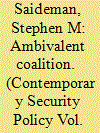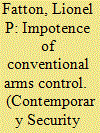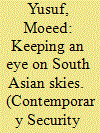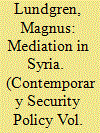|
|
|
Sort Order |
|
|
|
Items / Page
|
|
|
|
|
|
|
| Srl | Item |
| 1 |
ID:
146815


|
|
|
|
|
| Contents |
The effort to degrade and defeat the Islamic State is like many other multilateral military efforts – characterized by widely varying contributions to the effort. This article seeks to understand the patterns of contributions. Three sets of explanations are applied: the lessons of Afghanistan and Libya, variations in how potential contributors feel the threat posed by the Islamic State, and domestic political dynamics. While there may be some political processes that overlap with the big lessons and with the threat of the Islamic State, the patterns of contributions thus far suggest that the key drivers of reactions to the Islamic State are the desire not to repeat Afghanistan combined with some impetus provided by Islamic State attacks in the various homelands. The conclusion suggests some policy implications as well as some ideas for future research.
|
|
|
|
|
|
|
|
|
|
|
|
|
|
|
|
| 2 |
ID:
146816


|
|
|
|
|
| Contents |
The Paris terrorist attacks in January and November 2015 have changed the relationship between French society and security. For the first time since the end of the Second World War, the assumption that France is experiencing a new form of territorial war is explicit in the public debate. It has reinforced the strong conviction among the French politicians and diplomats that security requires close cooperation with the USA and a renouncement of the Gaullist paradigm of exceptionalism. This paper analyses why the terrorist attacks have been perceived in France as a form of territorial war. Second, it explains why terrorism contributes to a growing mistrust of the French public vis-à-vis the European Union. Finally, it shows the reasons but also the limits of French military activism outside Europe, in close connection with the US-led strategy.
|
|
|
|
|
|
|
|
|
|
|
|
|
|
|
|
| 3 |
ID:
146811


|
|
|
|
|
| Contents |
Amid tensions with the West over Ukraine, Russia pulled out of the Treaty on Conventional Armed Forces in Europe in March 2015. The Russian case is another example of a country disengaging from conventional arms control when relations with other member states deteriorate. This raises an important question: can arms control regimes aimed at preventing conflict survive periods of tension and preserve peace? This article argues no. It demonstrates that the prospect and stability of conventional arms control regimes depend on healthy international relations. In times of tension, governments rely on military institutions for advice and absorb military biases incompatible with arms control. Therefore, these regimes fail when most needed and are impotent as instruments of peace. Beyond conventional arms control, the article hints at the fragility of nuclear agreements such as the 2015 Iran deal and the 2010 New START between the United States and Russia.
|
|
|
|
|
|
|
|
|
|
|
|
|
|
|
|
| 4 |
ID:
146813


|
|
|
|
|
| Contents |
Since declaring their nuclear weapons capabilities in 1998, India and Pakistan have engaged in three major crises that each threatened to escalate into war. In each crisis, the USA engaged in active diplomacy to dissuade the South Asian rivals from taking escalatory actions. Previous literature on the crises has described the American role, but has not theorized third-party involvement in a nuclearized regional rivalry. We apply Timothy Crawford’s pivotal deterrence theory to the nuclearized India–Pakistan conflict, and extend the original theory to cover the novel condition of a non-superpower nuclear dyad, in the context of a single-superpower international system. We find that America’s pivotal deterrence generally enhanced stability in the India–Pakistan crises, and unlike in pre-nuclear South Asia, other great powers supported American diplomacy. However, we suggest that future regional crises between nuclear rivals, in South Asia or elsewhere, may present greater challenges for pivotal deterrence.
|
|
|
|
|
|
|
|
|
|
|
|
|
|
|
|
| 5 |
ID:
146814


|
|
|
|
|
| Contents |
This article investigates mediation efforts in Syria from the outbreak of the civil war in 2011 through the spring of 2016. It describes the principal initiatives, analyses differences and similarities across mediators, and identifies strategic obstacles that prevented substantive progress. Focusing on mediation initiatives undertaken by the Arab League and the United Nations, it finds that there is considerable path dependence across efforts and that most of the limited achievements, notably ceasefires in 2012 and 2016, resulted from the application of external leverage. Settlement in Syria was conditioned on overcoming significant commitment problems, aggravated by sectarian mistrust, the fractured nature of the opposition, and international disunity. The article contributes the first review of mediation in Syria that comprehends the conflict in its entirety, systematizes data for research on conflict management, and evaluates existing mediation policy in Syria with an eye to the future.
|
|
|
|
|
|
|
|
|
|
|
|
|
|
|
|
| 6 |
ID:
146812


|
|
|
|
|
| Contents |
Why do armies often fail to transmit and coherently apply lessons from their past? Using the concept of ‘layered organizational culture’, this article formulates a pioneering theoretical argument to explain how military organizations learn from their historical experience. Analysing empirical material from internal debates within the British Army, the article observes an inherent incompatibility between lessons gleaned from, on the one hand, the Anglo-Afghan Wars and, on the other hand, British counterinsurgency campaigns after 1945. This is less a result of actual differences in the external context but of changing organizational ‘filters’: different layers of military organizational culture result in different ways of selecting and transmitting relevant lessons from warfare experience. Older and newer cultural layers can interact and thus contribute to incoherent strategy-making in the present. This argument is illustrated by reviewing the layering process within the British Army since the 19th century. The article shows a shift from emphasizing the specificity of local contexts towards the application of universal principles. This has contemporary relevance: co-exisiting yet incompatible historical lessons contributed to significant incoherence in operational strategy during the initial months of the British deployment in Afghanistan in 2006.
|
|
|
|
|
|
|
|
|
|
|
|
|
|
|
|
| 7 |
ID:
146810


|
|
|
|
|
| Contents |
Russia and NATO have failed to establish binding institutional arrangements and they are now locked in increasingly dangerous security competition. A closer look at two issue areas where their efforts at binding have failed—NATO enlargement and missile defence—shows that Russia and NATO find themselves facing a ‘catch 22’. They need binding arrangements to overcome the relative gains problems that inhibit security cooperation, yet their concerns about relative gains prevent them from establishing these arrangements in the first place. To overcome this dilemma, NATO and Russia have to craft binding arrangements that seriously address each side’s concerns about relative gains. Less formal and institutionalized binding arrangements may better serve this goal. Such arrangements will not put an immediate end to security competition, but they will help them build a higher level of trust, allowing them to gradually develop deeper and more comprehensive binding arrangements.
|
|
|
|
|
|
|
|
|
|
|
|
|
|
|
|
|
|
|
|
|